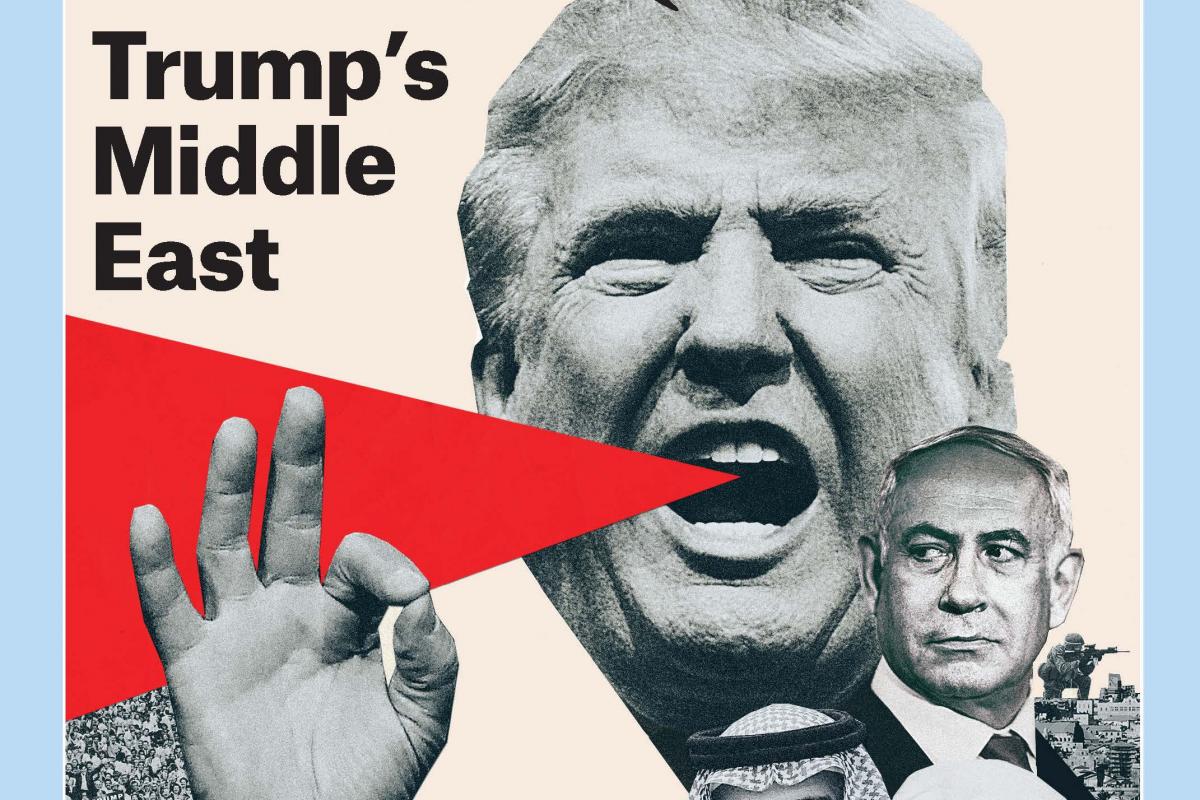The "Bromance" Factor: Examining Trump's Relationships With Middle Eastern Leaders

Table of Contents
The Trump-MBS Relationship: A Complex Alliance
The relationship between Donald Trump and Mohammed bin Salman (MBS), the Crown Prince of Saudi Arabia, was arguably the most significant and controversial of Trump's Middle Eastern partnerships. This complex alliance was built on a foundation of shared strategic interests and lucrative economic ties, yet overshadowed by serious human rights concerns.
Economic Ties and Arms Deals
The Trump administration oversaw a significant increase in arms sales and economic agreements between the US and Saudi Arabia.
- Massive Arms Deals: Billions of dollars worth of arms sales were approved, including advanced weaponry systems. These deals bolstered Saudi Arabia's military capabilities but also raised concerns about regional arms races and the potential for civilian casualties.
- Energy and Investment: Significant energy deals and investment collaborations were fostered, strengthening economic interdependence between the two nations. However, critics pointed out the lack of sufficient consideration for Saudi Arabia's human rights record in these agreements.
- Criticism and Human Rights: The sheer volume of these deals fueled criticism that the Trump administration prioritized economic gain over human rights concerns, particularly given Saudi Arabia's human rights record.
Shared Strategic Interests
Trump and MBS found common ground in several key areas:
- Counter-Terrorism: Both administrations emphasized cooperation in combating terrorism, with Saudi Arabia viewed as a key partner in this endeavor. However, the definition of “terrorism” and the methods employed remained points of contention among some analysts.
- Containing Iran: A shared concern over Iran's regional influence led to increased alignment on policies aimed at countering Iranian expansionism. This cooperation sometimes led to risky military actions that critics condemned.
- Regional Stability (A Contested Notion): While both sides claimed a desire for regional stability, their approaches sometimes diverged, leading to contradictory actions and outcomes.
The Khashoggi Assassination and its Aftermath
The brutal assassination of Jamal Khashoggi, a Saudi journalist and US resident, in 2018 severely tested the Trump-MBS relationship.
- Trump's Response: Trump's response was criticized as being too lenient, prioritizing the strategic alliance over accountability for the murder. This response triggered widespread condemnation from human rights organizations and some members of the US Congress.
- Long-Term Consequences: The Khashoggi assassination cast a long shadow on the US-Saudi relationship, raising questions about the ethical considerations of prioritizing strategic partnerships over human rights. The incident also significantly impacted public perception of the Trump administration's foreign policy.
Trump's Interactions with Other Middle Eastern Leaders
While the relationship with Saudi Arabia dominated headlines, Trump cultivated relationships with other key Middle Eastern leaders.
Egypt's Al-Sisi
Trump enjoyed a strong working relationship with Egyptian President Abdel Fattah el-Sisi.
- Security Cooperation: Significant security cooperation continued, focusing on counter-terrorism efforts and regional stability. Critics pointed to a lack of emphasis on human rights issues within Egypt under Al-Sisi.
- Economic Ties: Economic ties also remained strong, including continued US aid and investment in Egypt. Transparency in these dealings was frequently questioned.
- Human Rights Concerns: Concerns persisted about Egypt's human rights record, with many arguing that the close relationship between Trump and Al-Sisi undermined efforts to address these issues.
Israel's Netanyahu
The relationship between Trump and Israeli Prime Minister Benjamin Netanyahu was marked by close personal ties and significant policy alignment.
- Abraham Accords: The Abraham Accords, brokered by the Trump administration, normalized relations between Israel and several Arab nations (UAE, Bahrain, Sudan, Morocco), a landmark achievement. This diplomatic success was hailed as one of Trump’s biggest foreign policy wins.
- Jerusalem Recognition: Trump's recognition of Jerusalem as Israel's capital and the subsequent relocation of the US embassy was highly controversial but cemented his support amongst Israeli hardliners.
- Palestinian Issue: Critics argued that Trump's pro-Israel stance neglected Palestinian concerns and damaged the prospects for a two-state solution.
Other Key Relationships
Trump also interacted with leaders from other Middle Eastern countries, including the UAE and Oman, resulting in various agreements and initiatives related to security, trade, and regional cooperation. These relationships often mirrored the patterns seen in his dealings with Saudi Arabia, Egypt, and Israel—a mix of economic ties, shared strategic interests, and significant criticism related to human rights considerations.
Impact on US Foreign Policy in the Middle East
Trump's approach to the Middle East represented a significant departure from previous administrations.
Shifting Priorities
- Reduced US Military Engagement: Trump emphasized reducing US military involvement in the region, advocating for a less interventionist approach compared to his predecessors. This shift influenced his actions regarding ongoing conflicts.
- Prioritizing Economic Interests: Economic considerations played a more prominent role in Trump's foreign policy, leading to a focus on trade deals and arms sales, even if this sometimes appeared to supersede human rights considerations.
- Unconventional Diplomacy: Trump's personal style of diplomacy, characterized by unconventional methods and direct engagement with leaders, was a notable departure from more traditional diplomatic practices.
Long-term Consequences
The long-term consequences of Trump's Middle East relationships are still unfolding.
- Regional Stability: The impact on regional stability is a complex issue; some initiatives (such as the Abraham Accords) fostered cooperation, but others potentially destabilized existing power dynamics.
- US Credibility: Trump's approach raised questions regarding US credibility and its commitment to long-standing values, particularly regarding human rights.
- International Relations: His policies influenced US standing amongst its allies and created both opportunities and challenges in terms of international relations.
Conclusion:
Donald Trump's relationships with Middle Eastern leaders were characterized by a unique brand of diplomacy, often described as unconventional. This analysis of the "bromance" factor reveals a complex interplay of strategic interests, economic incentives, and personal chemistry. While some lauded these relationships for fostering cooperation and achieving specific goals (like the Abraham Accords), others criticized them for overlooking human rights concerns and potentially undermining long-term stability in the region. Further research is crucial to fully understand the lasting impact of these relationships on the future of US foreign policy in the Middle East. To delve deeper into the intricacies of Trump Middle East relationships, explore further academic resources and news archives.

Featured Posts
-
 40
May 17, 2025
40
May 17, 2025 -
 News Analysis Trumps Middle East Journey May 15 2025 And Its Presidential Ramifications
May 17, 2025
News Analysis Trumps Middle East Journey May 15 2025 And Its Presidential Ramifications
May 17, 2025 -
 Bayesian Superyachts Demise Investigation Uncovers Details Of Final Moments Linking Giant Mast To Tragedy
May 17, 2025
Bayesian Superyachts Demise Investigation Uncovers Details Of Final Moments Linking Giant Mast To Tragedy
May 17, 2025 -
 Thibodeau On St John S Knicks Coach Impressed By Recent Success
May 17, 2025
Thibodeau On St John S Knicks Coach Impressed By Recent Success
May 17, 2025 -
 Pistons Vs Knicks Brunsons Health Key To Eastern Conference Playoff Race
May 17, 2025
Pistons Vs Knicks Brunsons Health Key To Eastern Conference Playoff Race
May 17, 2025
